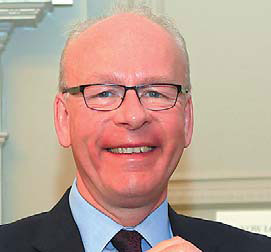Two heads are better than one
Updated: 2015-01-16 10:23
By Cecily Liu(China Daily Europe)
|
|||||||||||
Business schools create partnership for a dual approach to studies
The Swiss business school IMD has joined Cheung Kong Graduate School of Business of China to offer a dual executive master of business administration program that helps Chinese and Western executives learn about doing global business alongside one another.
Neil Selby, the director of executive education of CKGSB Europe, says the program is unique because it allows students to gain an understanding of both the Chinese and Western perspectives of doing business, and that the two will be given equal weight.
This approach is different from many other dual EMBA programs worldwide, which have a Western-centric focus, despite having classes or semesters taught in China, he says.
The first students are due to start their dual EMBA degree course in September, a 22-month program divided into a "foundation stage", in which mainly theory is taught, and a "mastery stage", which focuses on case studies.
In the foundation stage, students will study for three weeks at IMD's campus in Lausanne and another three weeks in CKGSB's campus in Beijing.
The mastery stage has five weeks of class time, focusing on meeting businesses in the real world, such as in London, Africa, Shanghai, Beijing and Lausanne.
He also involves the study of theories, an examination and six writing assignments. The foundation stage runs from February to August, and the mastery stage from September to the following September.
At the graduation ceremony, all the essays the students have written will be bound together and presented to them by a well-known alumnus.
To ensure that the CKGSB-IMD program offers equal weight to the two perspectives, the two schools have carefully considered the program, a process led by Phil Rosenzweig, professor of strategy and international business at IMD, and Teng Bingsheng, associate professor of strategic management at CKGSB.
Course content includes the implications of Chinese businesses going global, the leadership of internationally recognized Chinese companies such as Baidu and Alibaba, and insight into how the Chinese state works with businesses.
The program also analyzes humanities in Western and Chinese thinking systems and how they influence business decisions. The Chinese philosophies of Confucianism, Daoism and others will also be examined.
The two business schools have also jointly devised the program's marketing strategy and share developments on a monthly basis. They attend many business school fairs to explain the program, the fee for which is 105,000 Swiss francs ($103,000, 87,400 euros), to prospective students.
The aim is for the first intake to have about 40-50 students, half of whom would come from China.
To apply for the program, the students would need to write an essay about themselves, what they hope to learn from the program and how they wish to help companies they work for become more global. They would then be interviewed by the program administrator, by Teng and by Rosenzweig.
The students need about 10 years of industry experience and ideally should be leading their companies' expansion into or out of China.
Selby says the program has already received many strong applications, including many from high-profile executives. They are from a wide variety of countries, expanding across Europe, to Russia and South Africa.
The CKGSB-IMD collaboration grew from a three-and-a-half-day program called the China Strategy Challenge that the two business schools offered in 2013. The program, with a similar aim of bringing Chinese and Western executives together and encouraging them to share opinions, attracted about 70 students from China and the West last year.
Bill Fischer, program director of the China Strategy Challenge and professor of innovation management at IMD, said teaching the program has been an eye-opening experience.
"The students are highly successful entrepreneurs. It is very thought provoking to be in a room with such students as they all have high expectations of what they want to learn."
One benefit of having the Chinese and Western executives learning alongside each other is that they can discuss some of the assumptions and misconceptions they have toward each other, and realize that fundamentally they are the same as human beings, Fischer says.
"They had misconceptions about each other, for example about how the other side behaves during business negotiations.
"They had suspicions about their objectives not being the same, and beliefs, for example that the other side did not respect intellectual property, or that they only cared about profits. But when they came together and discussed these assumptions, they realized they are much more similar to each other (than they had thought)."
IMD was formed in 1990 through the merger of two management education centers: the International Management Institute, established in 1946 by Alcan, a Canadian mining company and aluminum manufacturer; and Institut pour l'Etude des Methodes de Direction de l'Entreprise Lausanne, established in 1957 by the food manufacturer Nestle.
Because of the history of the two management education centers, IMD is focused on executive education, which are short courses for senior management employees and accounts for more than 90 percent of the school's revenue.
This makes IMD different from most other business schools in the world, as MBA programs and EMBA programs are mainly the focus of most business schools, and executive education is just an added aspect, Fischer says.
This special characteristic of IMD has made it a good partner with CKGSB, which also has a strong focus on executive education. CKGSB, which was set up more than 10 years ago with the financial backing of the Li Ka-Shing Foundation, prides itself on teaching China's business elite through its Chinese EMBA programs.
The schools' alumni includes 25 percent of China's most influential businesspeople, who lead companies responsible for 13.7 percent of the country's GDP, more than $1 trillion (721 million euros) in sales and 20 percent of China's top brands, CKGSB says.
Apart from IMD's high-quality teaching, one benefit of learning about doing business in Switzerland is that learning will be done in a politically neutral space, Fischer says.
"There is no dominant ideology held by political powers in Switzerland, as it is a very international country. Therefore conversations will be about how we do business, and students will be coming from everywhere in the world."
He recalls a Russian student recently expressing his view on the turmoil in his country resulting from sanctions imposed on it relating to Ukraine. He told his classmates of his concerns for his relatives, emotions his classmates found easy to relate to.
Globally, a duel EMBA is becoming increasingly prominent as many business schools are recognizing that doing business in a global environment cannot be learned in any one country.
In this sense, the CKGSB-IMD program fits in with the trend, but Selby emphasizes that it is a program uniquely giving a central place to a Chinese perspective.
Many of the students from Western countries who have applied for the program are also those who understand the importance of China, and have a vision that the future of global business is inseparable from China.
"In the past, business school programs have relied on Western mindsets, but we have set out to change that," Selby says. "We are also creating communities of alumni who understand each other, and these communities will play an important part in how China and Europe do business."
cecily.liu@chinadaily.com.cn
|
The campus of the Swiss business school IMD in Lausanne. Photos provided to China Daily |
|
Bill Fischer, program director of the China Strategy Challenge |
|
Neil Selby, the director of executive education of CKGSB Europe |
(China Daily European Weekly 01/16/2015 page8)
Today's Top News
Italian president resigns
British hospital says has suspected Ebola case
Putin not to attend Auschwitz events
Turkey to help in foiling suspects from Xinjiang
Black Box of crashed AirAsia jet retrieved
Arson attack at paper that ran Charlie Hebdo cartoons
Improved screening to secure safe blood transfusion
Ambitious course set for global airliner market
Hot Topics
Lunar probe , China growth forecasts, Emission rules get tougher, China seen through 'colored lens', International board,
Editor's Picks

|

|

|

|

|

|








